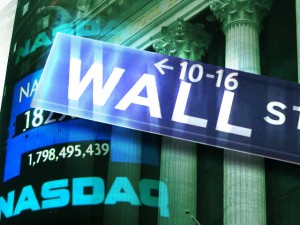 Last week there were record gains on Wall Street; this week there are record losses. But trying to get even the savviest market analyst to provide a rational explanation for this is rather like trying to get a monkey to do algebra.
Last week there were record gains on Wall Street; this week there are record losses. But trying to get even the savviest market analyst to provide a rational explanation for this is rather like trying to get a monkey to do algebra.
In fact, major markets around the world continue to rise and fall based primarily on idle-minded rumors which trigger wild swings between investors’ hopes that governments will implement fiscal policies to stabilize their respective economies and fears that they will not.
But am I the only one who finds this ironic? Markets, after all, are supposed to be self-regulating and self-correcting … by some invisible hand, no?
I do not think Obama should be blamed for the fact that investor confidence on Wall Street is so fickle these days that any idle-minded rumor can cause the market to plummet 500 points in a minute [i.e. the fundamentals of the market be damned].
(Obama … Hope … Doom, The iPINIONS Journal, The iPINIONS Journal, February 24, 2009)
 It has become fashionable in America to talk about the government destroying jobs and the market creating them. Yet nobody can cite a single instance where the government was responsible for the cycles of economic bubbles and busts that have characterized the U.S. economy in recent decades; except insofar as the government failed to adequately regulate the irresponsible, if not corrupt, market practices that caused each and every one of them.
It has become fashionable in America to talk about the government destroying jobs and the market creating them. Yet nobody can cite a single instance where the government was responsible for the cycles of economic bubbles and busts that have characterized the U.S. economy in recent decades; except insofar as the government failed to adequately regulate the irresponsible, if not corrupt, market practices that caused each and every one of them.
Frankly, I have always believed that the concept of “rational markets” is theoretical nonsense more worthy of a financial con-artist like Charles Ponzi than of a celebrated economist like Friedrich Hayek. For markets are, and have always been, only as rational as the ability of insider traders to rig them.
It is not surprising therefore that the only people still arguing that governments should let the markets sort out this economic mess, which this misguided belief in the markets caused in the first place, are delusional political ideologues (like Rick Perry) who probably don’t know F.A. Hayek from Jesus Christ.
In fact, nothing vindicates the necessity of having the very visible hand of government stimulating economic growth, regulating business activities and stabilizing markets with sound fiscal policy quite like major corporations and small businesses alike complaining about uncertainty over government policies in these respects hampering their productivity.
Hell, these oxymoronic free marketeers would have you believe that uncertainty is a black cloud that suddenly appeared over the markets on the day Barack Obama was inaugurated president of the United States. Never mind that, since then, there has been enough certainty that they have realized record profits, and are now sitting on trillions in cash instead of reinvesting it to hire people and expand their businesses, which sound business practices clearly dictate.
In any case, I applaud Obama for finally proposing a Keynesian jobs bill that focuses more on government spending to rebuild the country’s infrastructure and improve other areas (like education and law enforcement) than on catering to financial institutions that do little more than inject irrational exuberance or irrational fear into the economy.
Markets can remain irrational a lot longer than you and I can remain solvent.
(Father of Keynesian economics John Maynard Keynes, quoted by A. Gary Shilling, Forbes (1993) v. 151, iss. 4, pg. 236)
Related commentaries:
Obama … Hope … Doom
Chickens come home to roost on Wall Street